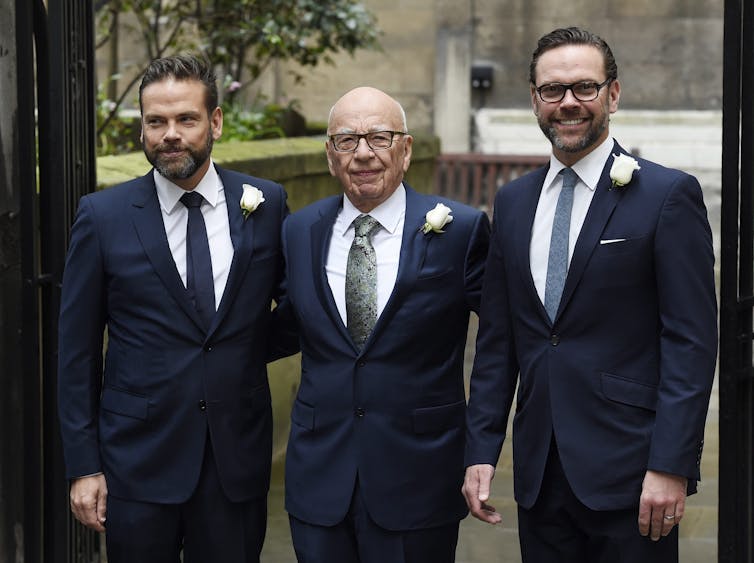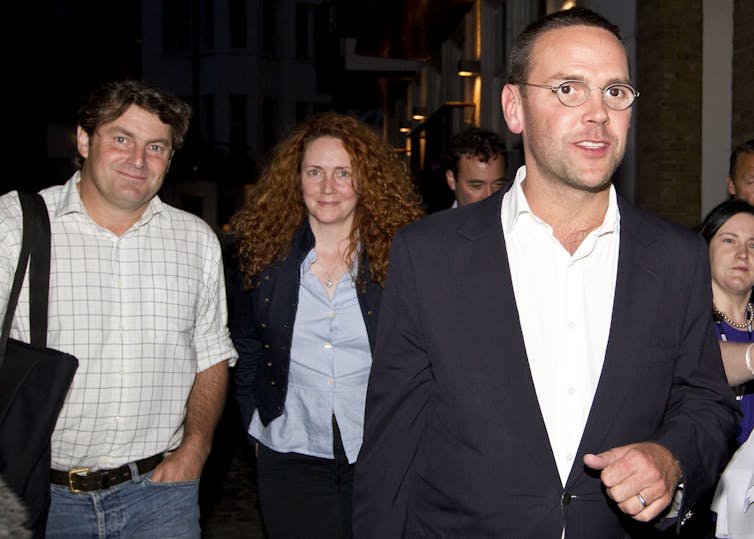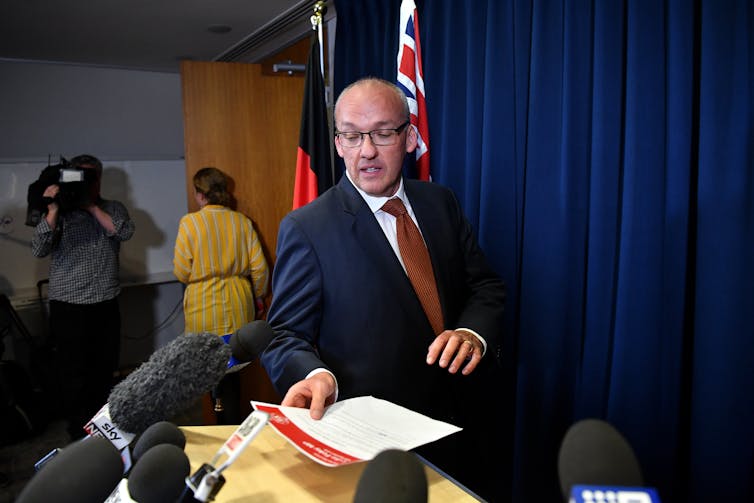David Clune, University of SydneyGladys Berejiklian will be remembered as premier of NSW for her resilience, level-headedness, crisis management skills, and administrative competence — and, of course, the ICAC investigation that toppled her.
Decent, determined and hard-working, she was unflappable in adversity.
Berejiklian leaves a legacy of economic achievement and major infrastructure creation. She achieved a major milestone both personally and for women by being the first female NSW premier to win a general election.
Energetic, effective and politically astute
Of Armenian descent, Berejiklian began her career in politics working for former Liberal leader Peter Collins. She was prominent in the Liberal moderates faction and was president of the Young Liberals. After a sojourn in banking, she was elected MP for Collins’ former seat of Willoughby in 2003. She proved to be an energetic, effective shadow transport minister.
Berejiklian impressed Liberal leader Barry O’Farrell, who became something of a mentor. When O’Farrell became premier in 2011, Berejiklian served in the important transport portfolio.
She was tipped as a possible future premier because of her strong performance. However, when O’Farrell resigned after misleading an ICAC inquiry in April 2014, Mike Baird had the numbers in the party room. Berejiklian, who was personally close to Baird, withdrew from the contest and was elected deputy leader. She was treasurer and industrial relations minister in the Baird government.
Berejiklian’s time came when Baird resigned in January 2017 — she was elected Premier unopposed in late January 2017.
Berejiklian’s policy direction was similar to that of her predecessor, with a strong focus on economics, infrastructure and public sector reform.
Also like Baird, Berejiklian was a small “l” liberal on social reform. She had a less outgoing personal style than Baird but succeeded in convincing the voters she was trustworthy, capable and sensitive to their needs.
The premier stabilised the government and showed it still had purpose and dynamism. She showed her political astuteness by quickly dumping the unpopular local government reforms that had been a factor in Baird’s downfall.
The premier survived two rounds of threatening by-elections in April 2017, a sign the anti-government feeling that marked the end of Baird’s term had diminished.
The serpentine politics of Sydney
The serpentine politics of Sydney sport and stadiums left Berejiklian wrong-footed at the end of 2017. She announced that both Allianz and Homebush stadiums in Sydney would be simultaneously demolished and rebuilt at an estimated cost of A$2.5 billion.
It was a major miscalculation that would haunt Berejiklian. Public reaction was overwhelmingly negative, a common theme being that it was a gross misuse of public funds to rebuild two stadiums, one only 17-years-old, instead of financing vital community facilities. The premier backtracked on the demolition of Homebush but much public resentment remained about Allianz.
In her campaign for the March 2019 election, Berejiklian ran largely on the government’s record.
The economy was performing well compared to other states, the public finances were in the best condition they had been in for a long time, and the infrastructure budget for the next four years was close to $90 billion. Labor leader Michael Daley made opposition to the demolishing and rebuilding of Allianz Stadium the spearhead of his campaign.
While not a flashy or magnetic campaigner, Berejiklian stayed “on message” and came across as sincere and conscientious. The result was a triumphant victory for her. The government’s two-party preferred vote was 52% and its primary vote 42% — 9% higher than Labor’s.
The premier had persuaded enough voters that the government had significant achievements to its credit and was better equipped to deliver more in the future.
Through bushfires and COVID
The last years of Berejiklian’s term were marked by skilful handling of major crises. Like other parts of Australia, in January 2020, NSW was ravaged by a devastating bushfire season, in which 25 lives were lost.
Unlike Prime Minister Scott Morrison, Berejiklian emerged from the bushfire crisis with enhanced prestige.
As political commentator Niki Savva, writing in The Australian, put it:
When the fires hit NSW, she made a point of being there, every day, standing next to the fire chief, Shane Fitzsimmons, supporting him and allowing him to do his job. She visited affected communities. Her embraces were accepted. No one refused to shake her hand.
No sooner had the bushfires ceased than the state was plunged into another crisis with the outbreak of coronavirus. Berejiklian responded in much the same way, this time with Chief Medical Officer, Kerry Chant, by her side.
The second NSW COVID outbreak proved to be more difficult and unpredictable to manage but by the time of her resignation the situation was coming under control.
Although she had been criticised by some for her handling of the crisis, Berejiklian’s calm, competent, communicative approach would seem to have resonated in the electorate.
ICAC’s Operation Keppel
ICAC’s Operation Keppel was inquiring into whether former Liberal MP for Wagga Daryl Maguire engaged in conduct that involved a breach of public trust.
Public hearings began in September 2020 and Berejiklian appeared as a witness in October.
In a disclosure that generated a widespread tsunami of shock, it was revealed the premier had been in a “close personal relationship” with Maguire from 2015 which had only recently ended.
Previously, the public persona of Berejiklian, who had never married, was that of a rather prim career woman wedded to her job.
Berejiklian said that she had no intention of quitting as she had done nothing wrong and most voters seemed to be sympathetic.
The general attitude was that she had made a miscalculation in her personal life, a not uncommon phenomenon, and did not deserve to be punished by losing her job.
As reporter Deborah Snow put it, writing in The Sydney Morning Herald,
there was relief inside the government that the crisis was playing out as a titillating love gone wrong scandal rather than a probity scandal.
The announcement of an ICAC inquiry into whether the premier had engaged in conduct that involved a “breach of public trust” as a result of her relationship with Maguire has precipitated her resignation.
She could have stepped aside pending the result of the inquiry, but instead has chosen to take the same course as O’Farrell, who decided to do the honourable thing and walk.
Read more:
The long history of political corruption in NSW — and the downfall of MPs, ministers and premiers
![]()
David Clune, Honorary Associate, Government and International Relations, University of Sydney
This article is republished from The Conversation under a Creative Commons license. Read the original article.





You must be logged in to post a comment.